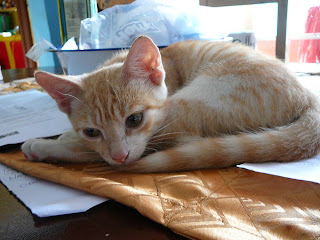



I arrived in Makeni on the afternoon of October 29. The hospital sent a driver to pick me up from Freetown and the road between the 2 cities is really good. It's paved and smooth....no craters right now;-) When we first pulled up to the house, I was greeted by a swarm of neighbourhood children screaming "oputo, oputo!" meaning white person. They all want to touch you, talk to you, and check you out. Apparently, that's the way it is every time you walk outside the house... you have celebrity status and can never go anywhere unnoticed or even unaccompanied by a local person asking to be your "friend" and requesting money. Everyone here speaks Krio or Temne, so I'm going to have to learn as much as I can!
Our house is pretty nice. We live in a place with a wall around the yard for security. One of the other volunteers who lives in another house that's not located in a compound was telling me that she had no privacy at all. There would always be a number of people peering at them through the windows the whole time they were in the house and the neighbours would just walk into the house if you didn't lock the door. I'm also glad that we have a kitten, Gingersnap, in our house because she keeps the mice, rats, and cockroaches away. The other volunteers I live with, Celine (from Vancouver) and Suzie (from England) said that the rodents were pretty bad before they got the cat. Suzie has had a planter built in the courtyard of our house and planted some vegetables there. I'd like to have some more gardens built so we can grow more veggies. The house has running water, so we have sinks, a cold shower and flush toilet. We have to use the generator to pump water from the well into a holding tank, and then the water runs by gravity into the house. The house has 4 bedrooms, living room, dining room, 2 bathrooms, and a kitchen equipped with gas stove. No refrigeration!
There are about 8 VSO vounteers in Makeni and there is also a group of volunteers that work at a Dutch hospital at the other end of town. It's a great group of people and they are taking good care of me.
We took a quick walk to the market but I haven't had a chance to take a good look around yet. I haven't been to the hospital yet. Everyone gets around on motorcycle taxis in Makeni so I'm glad I have my motorcycle helmet for those. We don't need to drive a motorcycle on our own as of yet. It costs 1,000 leones for a one way trip for an ocada (motorcycle taxi). I've been told that Le2,950 or Le3,000 are equivalent to one American dollar. It costs Le3,000 for a local beer. The canned and packaged food is quite pricey and in limited supply at the supermarkets in Makeni. We have to stock up when someone visits Freetown.
I'll try to post some photos soon. We have to go from place to place (hotel, hospital, etc.) and charge our electronics when they have the generators running. We use our generator sparingly because fuel is expensive.
Our house is pretty nice. We live in a place with a wall around the yard for security. One of the other volunteers who lives in another house that's not located in a compound was telling me that she had no privacy at all. There would always be a number of people peering at them through the windows the whole time they were in the house and the neighbours would just walk into the house if you didn't lock the door. I'm also glad that we have a kitten, Gingersnap, in our house because she keeps the mice, rats, and cockroaches away. The other volunteers I live with, Celine (from Vancouver) and Suzie (from England) said that the rodents were pretty bad before they got the cat. Suzie has had a planter built in the courtyard of our house and planted some vegetables there. I'd like to have some more gardens built so we can grow more veggies. The house has running water, so we have sinks, a cold shower and flush toilet. We have to use the generator to pump water from the well into a holding tank, and then the water runs by gravity into the house. The house has 4 bedrooms, living room, dining room, 2 bathrooms, and a kitchen equipped with gas stove. No refrigeration!
There are about 8 VSO vounteers in Makeni and there is also a group of volunteers that work at a Dutch hospital at the other end of town. It's a great group of people and they are taking good care of me.
We took a quick walk to the market but I haven't had a chance to take a good look around yet. I haven't been to the hospital yet. Everyone gets around on motorcycle taxis in Makeni so I'm glad I have my motorcycle helmet for those. We don't need to drive a motorcycle on our own as of yet. It costs 1,000 leones for a one way trip for an ocada (motorcycle taxi). I've been told that Le2,950 or Le3,000 are equivalent to one American dollar. It costs Le3,000 for a local beer. The canned and packaged food is quite pricey and in limited supply at the supermarkets in Makeni. We have to stock up when someone visits Freetown.
I'll try to post some photos soon. We have to go from place to place (hotel, hospital, etc.) and charge our electronics when they have the generators running. We use our generator sparingly because fuel is expensive.
